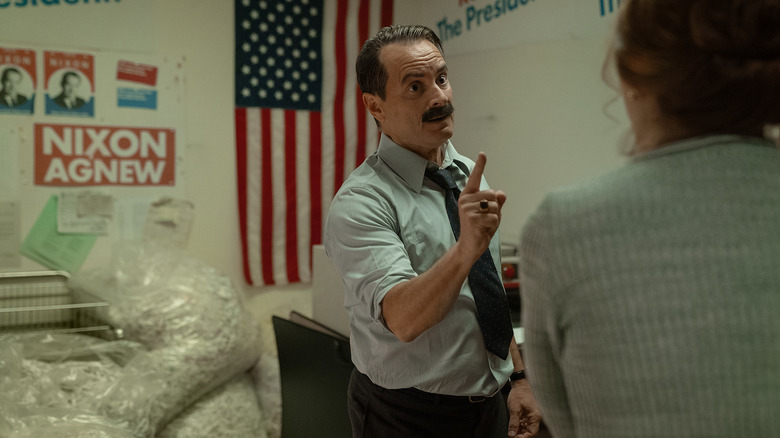Gaslit Review: The Watergate Story Gets A Fresh Spin
There's an excellent chance you know about Watergate, the scandal that brought down Richard Nixon, rocked the very foundations of the American government, resulted in the film "All The President's Men," and inspired a whole new school of political journalism. But do you know who Martha Mitchell was? If you were alive back in the Watergate era, probably. Otherwise, Mitchell might be little more than a footnote tucked away in the back of people's minds; a trivia question to get trotted out on rare occasions. But back in the '70s, Martha was a big deal. She was the wife of Nixon's Attorney General, John N. Mitchell. She was also a firebrand personality; a quirky, opinionated, unapologetic person who seemed to thrive on media attention. As Garrett M. Graff wrote in the recently published "Watergate: A New History,"
[H]er controversial and always conservative remarks became a balm to Nixon's "silent majority" base. She had it out for justices, educators, politicians, liberals, activists—even the nation's hairdressers. Margaret Mead? "She caused a lot of trouble." The Supreme Court? "Eradicate it!" Richard Nixon himself? "Sexy!" she declared. In an age where most high-ranking wives were still listed officially as mere extensions of their husbands, the idea of Martha making news under her own name was almost its own social revolution.
And yet, in the years since Watergate, Martha has faded from prominence in the Watergate story — despite the fact that she factored into the events when the scandal was just beginning to unfold, speaking to the press about nefarious goings-on long before Woodward and Bernstein broke the case. Martha's strange, traumatic Watergate saga was brought back into the spotlight with Leon Neyfakh's "Slow Burn" podcast, which devoted an episode to her. And now that has been adapted further into "Gaslit," a Starz series created by Robbie Pickering, featuring Julia Roberts as Martha and an unrecognizable Sean Penn, buried in prosthetic make-up, as John Mitchell.
Casting Roberts as the lead in anything is usually a good idea, and she's wonderful here, making Martha both outlandish and sympathetic (although the accent she uses sounds practically identical to the Southern twang she put on for her character in "Charlie Wilson's War"). The marketing for the show leans heavily on Roberts' presence, and creator and showrunner Pickering said in a recent interview that the aim of "Gaslit" was to shine a light on forgotten members of the story, especially women. "I don't think it's a mistake that the woman who played an instrumental role in this scandal was ignored and silenced," Pickering stated, adding:
"I have a 4-and-a-half-year-old daughter and I don't want her to learn about Watergate in the same way that I learned about it ... I want her to know that Martha Mitchell played an instrumental role in it, and she wasn't just some drunk crazy lady. She was right. She was the first person to publicly blow the whistle on these people. Hopefully, we can correct the record a little bit with this show."
That's all well and good, but those statements don't entirely track when watching "Gaslit." Again: this is no fault of Roberts. She's aces in the part, and every scene she has reminds us that, yep, Julia Roberts is still a damn movie star (even if she's on TV). But as good as Roberts might be, Martha is never quite as interesting as the rogues' gallery of Nixonian men who orbit around the story.
A great cast playing memorable characters
To the credit of "Gaslit," the show strives to give us the Watergate story from different players than we're used to. "All the President's Men" focused entirely on the reporters investigating the story, and left many of Nixon's cronies off-camera. Here, they all step out of the shadows (Nixon himself still remains an outsider, glimpsed here only via newspaper photos and archival footage). The marriage between the Mitchells is also a focus, and the couple seems to love each other at first — but the pressures of Watergate will soon begin a slow disintegration, one that begins with Martha being held prisoner and drugged in a hotel room to keep her from talking. Penn, as John Mitchell, is the latest actor to cover himself in heavy make-up — a trend that seems to bother many folks (see: Colin Farrell as the Penguin in "The Batman" or Renée Zellweger in "The Thing About Pam"). I confess I actually don't mind this trend, at least in theory. Indeed, I get a little kick out of watching actors literally transform themselves for a role.
That said, Penn's presence here is distracting. It's not that the make-up he wears isn't convincing — it's quite good, actually. It's just that Penn never disappears into the part. We're always aware it's him, and since we know what he normally looks like, we can't help but be distracted whenever he shows up. But Penn's role is wisely more of a supporting one, as he plays Mitchell as doggedly loyal to Nixon, digging himself deeper and deeper into an illegal hole.
The true standout of the series, though, is Shea Whigham as G. Gordon Liddy, the former FBI man who helped spearhead the Watergate burglary that would eventually snowball into a full-blown Nixon-ending scandal. Whigham is an absolute hoot, playing Liddy as someone unhinged in a quiet, disturbing way. Speaking in riddles, he's clearly out of his mind, first introduced holding his hand over an open flame as it burns and smokes just so he can prove his toughness. Whigham, one of our finest working character actors, sinks his teeth (and mustache) into the part, making Liddy both pathetic and scary, strange and captivating. Indeed, Whigham is so good here that I wish the show had nixed the Mitchells entirely and focused instead primarily on Liddy.
Other players do well, too. Dan Stevens is amusing as John Dean, the lawyer who turned on Nixon. The press hailed Dean as a hero, and he does deserve credit for speaking out. But in reality, Dean was a lot more craven and opportunistic than how he was portrayed in news stories, and Stevens plays the character as a loser who dreams of power. As the story unfolds, Dean courts a flight attendant named Mo (Betty Gilpin, sporting an unfortunate-looking wig), the type of person who can see right through Dean's B.S. — and call him out for it, too.
"Gaslit" is highly watchable and handsomely produced, and I do appreciate the way the series strives to focus on those on the margins of the story (Frank Wills, the Watergate security guard who initially reported the break-in, is given his own plotline, played with charm by Patrick Walker). But I can't help but think the show's obsession with Martha hinders things, keeping a good show from becoming even better.
"Gaslit" premieres April 24, 2022, on Starz.

